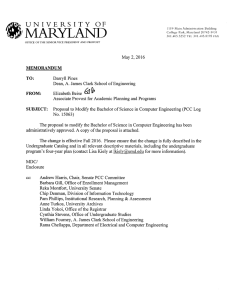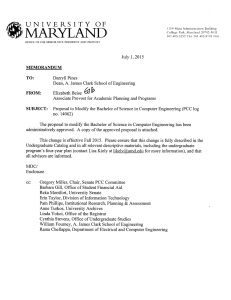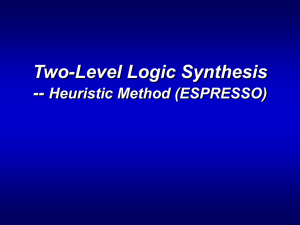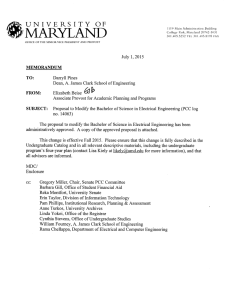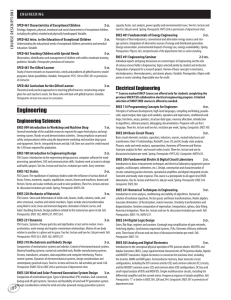MARYLAND U N I V E RS I T...
advertisement
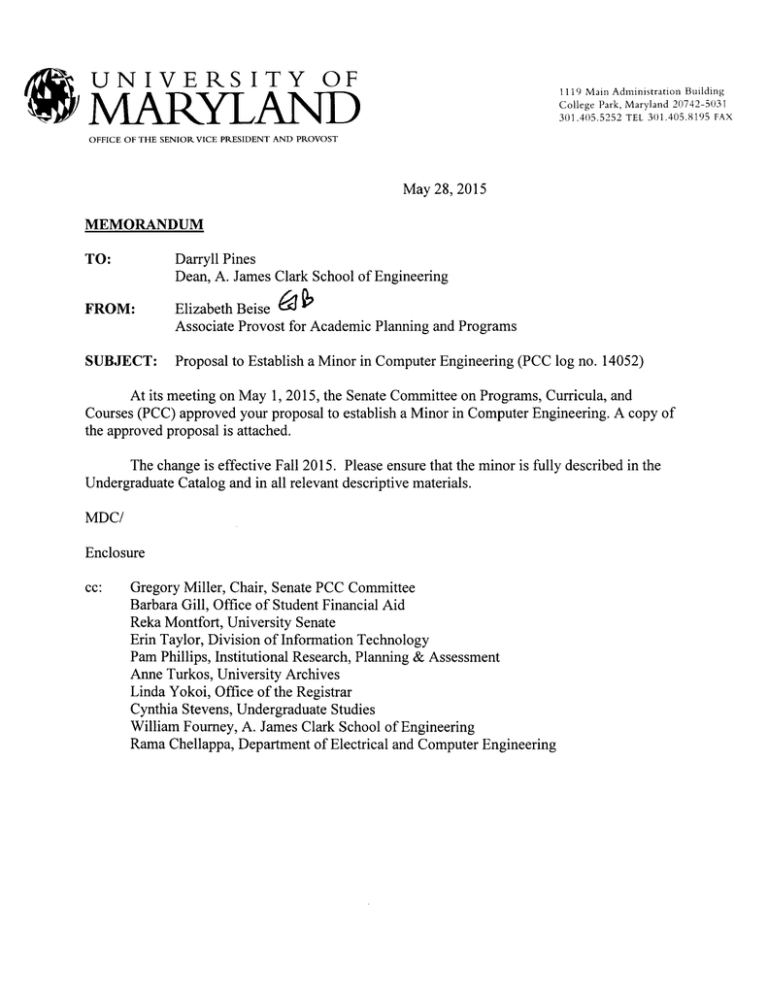
U N I V E RS I T Y OF 1119 M a i n A d m i n i s t r a t i o n B u i l d i n g College Park, M a r y l a n d 20742-5031 301.405.5252 TEL 301.405.8195 FAX MARYLAND OFFICE OF THE SENIOR VICE PRESIDENT AND PROVOST May 28, 2015 MEMORANDUM TO: Darryll Pines Dean, A. James Clark School of Engineering FROM: ElizabethBeise Associate Provost for Academic Planning and Programs SUBJECT: Proposal to Establish a Minor in Computer Engineering (PCC log no. 14052) At its meeting on May 1, 2015, the Senate Committee on Programs, Curricula, and Courses (PCC) approved your proposal to establish a Minor in Computer Engineering. A copy of the approved proposal is attached. The change is effective Fall 2015. Please ensure that the minor is fully described in the Undergraduate Catalog and in all relevant descriptive materials. MDC/ Enclosure cc: Gregory Miller, Chair, Senate PCC Committee Barbara Gill, Office of Student Financial Aid Reka Montfort, University Senate Erin Taylor, Division of Information Technology Pam Phillips, Institutional Research, Planning & Assessment Aime Turkos, University Archives Linda Yokoi, Office of the Registrar Cynthia Stevens, Undergraduate Studies William Foumey, A. James Clark School of Engineering Rama Chellappa, Department of Electrical and Computer Engineering T H E UNIVERSITY OF MARYLAND, C O L L E G E PARK PROGRAM/CURRICULUM/UNIT PROPOSAL Please email the rest of tlie proposal as an MSWord attachment PCC L O G NO. to I • Please submit the signed fonn to the Onkeofthe Associate Provost for Academic Planning and Programs, 1119 Main Administration Building. Campus. College/School: Please also add College/School Unit Code-First 8 digits: Unit Codes can be found at: huos://hvoDrod.umd.edu/Html Reoorts/unils.hlm Department/Prograni: Please also add Department/Program Unit Code-Last 7 digits: Type of Action (choose one): • • 0 • Curriculum change (including informal specializations) n New academic degree/awardproff-am Renaming ofptoffwn orformal Area of Concentration • New Professional Studies award iteration Addition/deletion offormal Area of Concentration S^ew Minor Suspend/delete program • Other Italics Indicate that the proposed program action must be presented to the full University S Summary of Proposed Action: The Department of Electrical & Computer Engineering proposes the establishment of a new minor in Computer Engineering. APPROVAL SIGNATURES - Please prinl>. sign, and date. Use additional lines for multi-u 1. DepartmentCommineeOiair 2. Department Chair — Wit 3. College/School PCC/fhair 4. Dean 5. Dean of the Graduate School (if required) 6. Chair. Senate PCC ^/ -r 7. University Senate Chair (if required) 8. Senior Vice President and Provost / ^ / ^ / ^ ^ 4 ^ Proposal to Establish a New Computer Engineering Minor Cornputing is everywhere, and it particularly permeates many fields of engineering. Quite a few engineering students want to become literate in core computing fields, even if they major in another field. The U.S. Department of Labor predicts that job growth in computing-related jobs, and particularly software-related jobs outpace nearly any other category (Bureau of Labor Statistics, 2014). The A. James Clark School of Engineering currently offers a Computer Engineering program for undergraduate students. Computer Engineering majors are the only students that have easy access to core computing courses, as well as advanced (e.g. senior level) computing related courses. Electrical Engineering majors, as well as other Engineering majors, are blocked from taking core and advanced level computing courses. In rare cases when students are allowed to enroll, their lack of background greatly handicaps their learning. The purpose of the Computer Engineering minor is to allow Electrical Engineering and other Engineering majors access to core computer courses, as well as some advanced-level courses. Primary Sponsoring Unit Department of Electrical & Computer Engineering (ECE), A. James Clark School of Engineering. Catalog Description The undergraduate Minor in Computer Engineering is a program offered by the Department of Electrical & Computer Engineering within the A. James Clark School of Engineering. The minor will introduce students to core hardware concepts-such as computer architecture, digital logic design, and digital circuit design—as well as core software concepts—such as algorithms, discrete mathematics, and programming. Students will also learn how hardware and software interact at the interface, for example in embedded systems. With a minor in computer engineering, students will not only receive preparation for entry into the computer industry, but they will also become more effective at applying computing in their primary field of study. Program Oversight The Director of Computer Engineering, currently Professor Donald Yeung, will serve as Program Director for the minor and will oversee the academic component of the minor. The ECE Undergraduate Studies Office (UGO) will monitor student progress in the minor. The ECE UGO will also process student applications for the minor. Additionally, the ECE UGO will provide early academic advising to Minor students and provide the appropriate course permission stamps. Minor Requirements & Courses The Computer Engineering minor will have 18 required credits of coursework. In addition to these requirements, the program will have two courses (7 credits) of prerequisite requirements. 1 Grade of B- or higher required. Course prereq: ENEE140 or CMSC131; or score of 5 on the A Java AP exam; or score of 4 or 5 on the AB Java AP exam; or satisfactory performance on the department's placement exam. Grade of B- or higher required, Course prerequisite; IVIATH140. Completion Requirements Eligibility and Application Process Admission to the minor will be limited to no more than 25 students in the initial year, selected through a competitive application process. The limitation of the first year's enrollment is necessary to assess the demand for the minor and the corresponding faculty courseload. The number of admitted students will be increased to a maximum of 35 in the second year and a maximum of 40 in the third year. In the third year of the minor, the Department will explore the feasibility of further increasing the number of admitted students and the possible need for additional resources. Students interested in applying in the minor must have completed at least 30 semester credits and have a minimum grade point average of a 3.0 at UMD for admissions consideration. Students must apply no later than 1 year prior to their anticipated graduation semester. Students seeking admission to the minor will be asked to complete an application form available on the ECE Department Website. A faculty admissions committee will review applications holistically. The faculty admissions committee will look for applicants with a strong GPA. Due to the similar nature of the courses, students in Computer Engineering and Computer Sciences will not be eligible to apply to the Computer Engineering minor. 3 Appendix A - IVIinor FAQs Q: Why not have the students simply take the CS algorithms course (CMSC 351)? A: The course CMSC 351 demonstrates the problem of acquiring the core computing knowledge by EE majors and other engineering majors; its prerequisites are CMSC 250 and CMSC 216, whose prerequisites are: CMSC 132 and CMSC 131; or 19 credits in total. Further, to be admitted to these courses by the CS departments, a student needs to at least commit to a minor in CS. A premise of the current proposal is that an EE major could obtain the knowledge required for a computer engineering minor by taking around 5 non-elective course credits, and some others through elective courses. Q: Why a CS minor is not good enough? A: It requires a total of 28 credits, which is too much for an EE major, as it would extend their time to graduation by more than a year. The proposed program effectively requires 10 credits from EE majors. Q: Is UMD behind peer institutions on this matter? A: Yes. This is not the situation at many other universities, where EE students are given the opportunity to study such core computing material. 4 Appendix B - Course Descriptions Pre-requisites MATH 141 Calculus II (4 cr) Prerequisite: Minimunn grade of C- in IVIATHMO. Or minimum grade of B- in MATH130; and permission of CMNS-IVIathematics department. Credit only granted for: MATH131, MATH141, or MATH221. Continuation of MATH140, including techniques of integration, improper integrals, applications of integration (such as volumes, work, arc length, moments), inverse functions, exponential and logarithmic functions, sequences and series. ENEE 150 Intermediate Programming Concepts for Engineers (3 cr) Prerequisite: ENEE140. Or permission of ENGR-Electrical & Computer Engineering department; and (score of 5 on the A Java AP exam; or score of 4 or 5 on the AB Java AP exam; or satisfactory performance on the department's placement exam). Corequisite: MATH140. Restriction: Must be in Engineering: Electrical program. Credit only granted for: ENEE114or ENEE150. Formerly: ENEE114. Advanced programming concepts: coding conventions and style; pointers; dynamic memory allocation and data structures; linked lists; graphs; abstract data types; object-oriented design. There will be team-based software projects and group presentations. Minor Requirements ENEE 244 Digital Logic Design (3 cr) Prerequisite: Permission of ENGR-Electrical & Computer Engineering department. Corequisite: ENEE150 or CMSC131. Restriction: Sophomore standing or higher; and must be in one of the following programs (Engineering: Computer; Engineering: Electrical). The design and analysis of combinational and synchronous sequential systems comprising digital logic gates and flip-flop memory devices; underlying tools such as switching and Boolean algebras and Karnaugh map simplification of gate networks; design and use of decoders, multiplexers, encoders, adders, registers, counters, sequence recognizers, programmable logic arrays (PLAs), read-only memories (ROMS, PROMS), and similar devices. Arbitrary radix conversion. ENEE 245 Digital Circuits and Systems Laboratory (2 cr) Prerequisite: Minimum grade of C- in ENEE244. And minimum grade of C- in ENEE150; or minimum grade of C- in CMSC132. And permission of ENGRElectrical & Computer Engineering department. Restriction: Must be in one of the following programs (Engineering: Electrical; Engineering: Computer). Introduction to basic measurement techniques and electrical laboratory equipment (power supplies, oscilloscopes, voltmeters, etc.). Design, construction, and characterization of digital circuits containing logic gates, sequential elements, oscillators, and digital integrated circuits. Introduction to digital design and simulation with the Verilog Hardware Description Language (HDL). ENEE 351 Theoretical Foundations of Computer Engineering (pending new course - 4 cr) Discrete structures, and introduction to algorithms and data-structures. The students will practice algorithms and data-structure programming, including basic complexity concepts studied in the course. 5 Minor Electives ENEE 359F Advanced FPGA-based System Design Using Verilog (3 cr) Prerequisite: ENEE245. Based on the knowledge and training gained in ENEE245,students will further develop their skills by working on more challenging digital system design using Verilog hardware description language (HDL) in an industry-standard design environment. Students will implement real-world designs in field programmable gate arrays (FPGAs) as well as test and optimize the FPGA-implemented systems. Students will also work in teams on multiple, medium-scale digital system design projects and make oral presentations and written reports. ENEE359X Introduction to System Programming (new pending course - 3 cr) ENEE 440 Microprocessors (3) Prerequisite: ENEE350; and completion of all lower division technical courses in the EE curriculum. Restriction: Must be in one of the following programs (Engineering: Computer; Engineering: Electrical). Microprocessor architectures, instruction sets, and applications. Bus structures, memory, I/O interfacing. Assembly language programming, LSI device configuration, and the embedding of microprocessors in systems.ENEE446: Digital Computer Design ENEE 459C Computer Security (3 cr) Prerequisite: ENEE150 or CMSC132 or permission of instructor, his course covers the foundations of modern cryptography and the current efforts from both academia and industry in building trustworthy computing. We will focus on the technology advances, industrial standards, and law enforcements that have been or have to be made to establish trust in four key areas to establish the trust in computing: security, privacy, reliability, and business integrity. ENEE459E Introduction to Cryptology (3 cr) Prerequisites: Any two 400-level MATH courses; or (CMSC351 and CMSC330); or (ENEE322 and ENEE380). Credit only granted for: ENEE459E, CMSC456, CMSC489R, or MATH456. Over the past two decades, cryptography has become a highly relevant field: In addition to military and national security applications, cryptography is currently being used in critical financial, legal, and social applications. The aim of cryptography is to construct efficient schemes that allow parties to interact to implement some functionality, even when some subset of parties are malicious and behave adversarially. In contrast to the classical approach based on heuristics and ad-hoc solutions, modern cryptography aims for specific, rigorous security guarantees based on precise mathematical definitions and provably secure protocols. ENEE 459P Parallel Algorithms (3 cr) Prerequisite: ENEE350 or (CMSC330 and CMSC351) and permission of department. Also offered as CMSC498M. Credit granted for ENEE459P or CMSC498M. Serial computers are passe, as practically all computers are becoming increasingly parallel machines. The course provides an introduction to the theory of parallel algorithms. It highlights parallel algorithmic thinking for obtaining good speed-ups with respect to serial algorithms. 6



